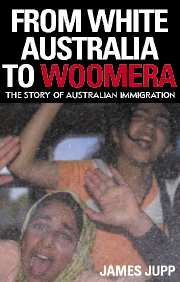Book contents
- Frontmatter
- Contents
- List of acronyms and abbreviations
- Introduction
- Chapter 1 Creating an immigrant society, 1788–1972
- Chapter 2 From assimilation to a multicultural society, 1972–2002
- Chapter 3 The Fraser, Hawke and Keating governments, 1975–1996
- Chapter 4 Policy instruments and institutions
- Chapter 5 Multicultural policy
- Chapter 6 The attack on multiculturalism
- Chapter 7 The impact of One Nation
- Chapter 8 Economic rationalism
- Chapter 9 Sustainability and population policy
- Chapter 10 Refugees and asylum seekers
- Chapter 11 A past, present and future success?
- Appendix I Chronology: 1972–2002
- Appendix II Ministers of immigration, departmental secretaries and gross annual settler intake, 1973–2002
- References
- Index
Introduction
Published online by Cambridge University Press: 05 July 2014
- Frontmatter
- Contents
- List of acronyms and abbreviations
- Introduction
- Chapter 1 Creating an immigrant society, 1788–1972
- Chapter 2 From assimilation to a multicultural society, 1972–2002
- Chapter 3 The Fraser, Hawke and Keating governments, 1975–1996
- Chapter 4 Policy instruments and institutions
- Chapter 5 Multicultural policy
- Chapter 6 The attack on multiculturalism
- Chapter 7 The impact of One Nation
- Chapter 8 Economic rationalism
- Chapter 9 Sustainability and population policy
- Chapter 10 Refugees and asylum seekers
- Chapter 11 A past, present and future success?
- Appendix I Chronology: 1972–2002
- Appendix II Ministers of immigration, departmental secretaries and gross annual settler intake, 1973–2002
- References
- Index
Summary
Thirty years ago Australia finally abandoned its ‘settled policy’ of excluding all immigrants who were not ‘white’. Instead of being the ‘most British’ country in the world it began to proclaim itself as the ‘most multicultural’. One-fifth of its people were no longer of predominantly British or Irish descent. This radical change appeared to have been accepted with very little opposition. Mass immigration continued. Between one-third and one-half came from backgrounds which would have excluded them during the previous seventy years. In March 2002 Australia officially welcomed the six millionth post-war immigrant – a Filipina information technologist.
At the same time Australia was responsible for detaining Afghan, Iraqi and Iranian asylum seekers at remote desert and Pacific Island camps: Woomera, Curtin, Port Hedland, Nauru and Manus Island. Their fates were uncertain. There were repeated riots and disturbances at Woomera and elsewhere. Policy made on the run in the election atmosphere of late 2001 had left many loose ends. Many hundreds of desperate individuals, including women and children, who sought to escape from states denounced by the United States as ‘the axis of evil’ had become pawns in a bureaucratic and political game. There was a basic contradiction between the continuing desire to people Australia and the fear that matters might get out of control.
- Type
- Chapter
- Information
- From White Australia to WoomeraThe Story of Australian Immigration, pp. 1 - 4Publisher: Cambridge University PressPrint publication year: 2002

